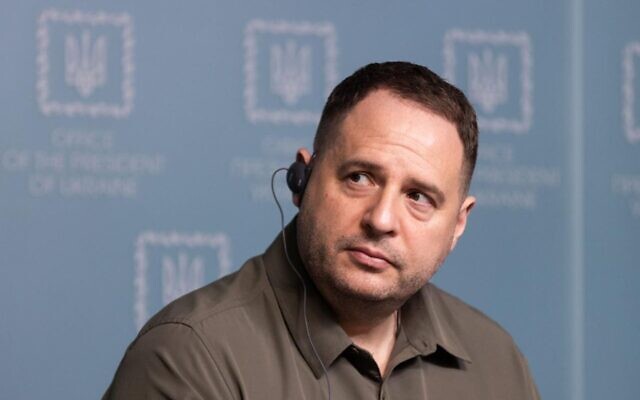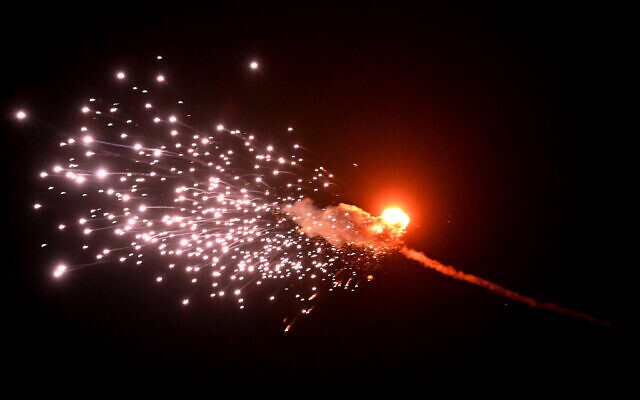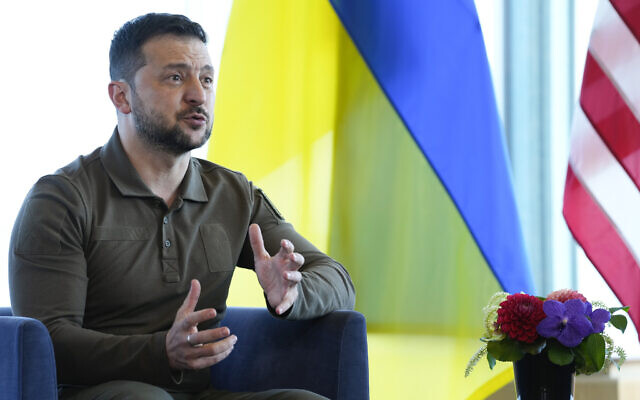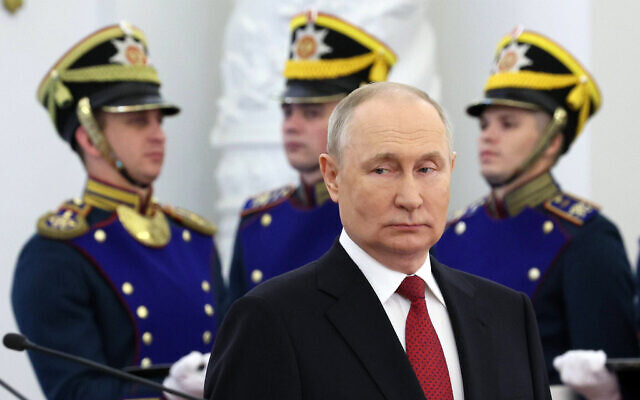Zelensky chief of staff: Only Israel can provide what we need against Iranian drones
Andriy Yermak says Kyiv also still wants Israeli weapons to rebuff Russian invasion, ‘cannot understand’ how Netanyahu has yet to visit
Carrie Keller-Lynn is a political and legal correspondent for The Times of Israel

A senior official close to Ukrainian President Volodymyr Zelensky expressed frustration on Tuesday over Israel’s continued refusal to provide his country with military assistance, saying he hoped to receive Israeli technology to combat Iranian drones deployed by Russia as part of Moscow’s 16-month-long invasion.
Speaking in translation from Kyiv, Andriy Yermak — Zelensky’s chief of staff — said that “nobody but Israel can provide equipment to combat attacks by Iranian drones,” but declined The Times of Israel’s request to elaborate on the specific technology requested from Israel.
Yermak expressed frustration that Prime Minister Benjamin Netanyahu has not openly supported Ukraine, and argued that weapons deals between Russia and Israeli enemy Iran should motivate Israel to join the fight.
“We can see the Kremlin dictator [Russian President Vladimir Putin] taking family photos with Iranian leaders and then this Iranian weaponry is being used against us and against you,” Yermak said to Israeli reporters from the Office of the Ukrainian President. “I don’t know what else is needed.”
Israel has walked a fine line since Russia first invaded Ukraine in February 2022, expressing moral and humanitarian solidarity for the embattled country but refusing to provide weapons. Israel has struggled to maintain good relations with both Kyiv and Moscow, balancing its affinity for Ukraine’s position with its security concerns vis-à-vis Russia in Syria and with Iran.
“Our position is 100 percent principled. We never forget about the fact that our Israeli friends and brethren have the same enemy as we do — I do not know why Israeli politicians do not agree,” Yermak said, focusing on Iran and glossing over Israel’s complicated web of security considerations relating to Russia.

“I cannot understand why we have so far had the pleasure of welcoming very many world leaders in Ukraine, but not the Israeli prime minister,” he added.
In February, Foreign Minister Eli Cohen visited Kyiv, where he met with Zelensky and his counterpart Dmytro Kuleba.
With containing a nuclear Iran and its terror proxies topping his priorities for the past decade and a half, Netanyahu has been consistently careful to not isolate Russia, which controls airspace over Syria, enabling Israeli airstrikes against Iran-backed forces and Hezbollah positions on Israel’s northern border.
Former prime ministers Naftali Bennett and Yair Lapid, who both served toward the start of the Russian invasion, were among the first to send humanitarian aid to Ukraine, and Lapid also condemned Russian aggression.
“I think it’s not enough to just maintain dialogue between our government officials,” Yermak said Tuesday. “I think it’s possible to elevate these relations to a higher level.”

Yermak, who noted that his “father is Jewish,” said that the rich history of Ukrainian Jewry makes it “natural” that “we should be friends and partners in our relations between Ukraine and Israel.”
Former Israeli prime minister “Golda Meir was born several blocks away from where I’m speaking to you in Kyiv,” he told The Times of Israel, and added that “two presidents and three prime ministers of Israel were born in Ukraine,” among other politicians and public figures.
Yermak, like many Ukrainian leaders, glossed over Ukrainian antisemitism and a history of violence against Jewish communities that motivated many Ukrainian emigres to flee to Israel.
Nazism plays an important symbolic role in Ukraine’s fight against Russia. Both countries see themselves as victims of German atrocities during World War II and Putin has accused Ukraine of harboring Nazis as part of his justification for invading its western neighbor.
On Friday, Putin tried to further that narrative by disclaiming Zelensky’s Jewish heritage, saying he is “not Jewish” and “a disgrace to the Jewish people.”

Putin later added that Zelensky was “a man with Jewish blood” before adding that “he covers for these freaks, these neo-Nazis, with his actions.”
“This is not a joke and not an attempt at irony, because today neo-Nazis, Hitler’s disciples, have been put on a pedestal as heroes of Ukraine,” Putin added.
Yermak said that Zelensky would not be commenting on Putin’s statement, but himself called the remarks “offensive and disgusting.”
He tried to touch upon Ukrainian Jewish heritage as a rationale for Israel supporting Ukraine, but declined to answer if Israel’s support was seen as critical, or more part of bolstering a broad community of nations throwing moral and materiel weight behind the country.
“It’s not just friendship that unites both of our nations. From all points of view, Israel’s support is important. It’s important to our people, no matter whether they are Jews are not,” he said.
Former Soviet dissident and later Israeli minister Natan Sharansky, who was present for the comments, told Yermak that while Israel should support Ukraine, “there are dark pages in our mutual history. Some recognized them and try to overcome them, and others try to misuse them.”
Ukrainian First Lady Olena Zelenska is currently in Israel as part of an international tour to rally humanitarian support for her country. Together with her Israeli counterpart, Michal Herzog, Zelenska met with a range of medical and psychological experts in Israel on Monday.









